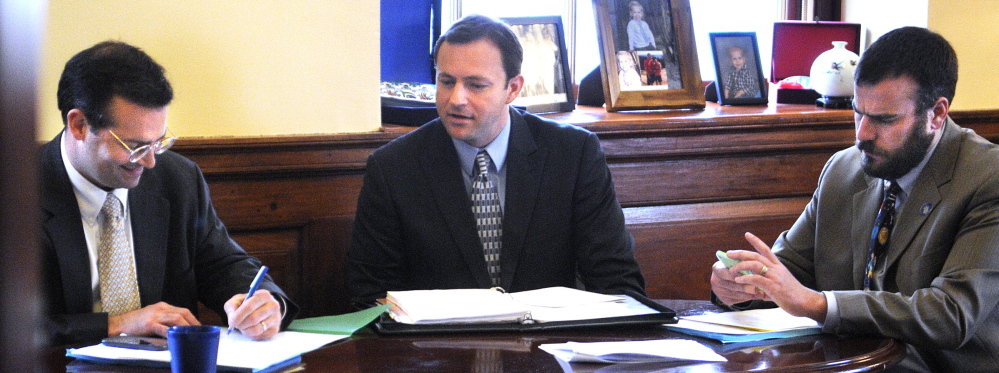AUGUSTA — Veto votes came fast and furious and mostly with little debate on Thursday as Maine lawmakers resumed work to decide the fate of nearly 50 bills that were vetoed by Gov. Paul LePage over the past several days.
The Maine House and Senate both convened in the morning and again in the afternoon, sending bills back and forth at a torrid pace across the third floor of the State House.
With just one veto left outstanding by late Thursday, the results favored Gov. LePage and the Republicans. Of 48 vetoes, 32 had been upheld as of 9 p.m., including eight that were overridden in the House but sustained in the Senate.
Perhaps the biggest vote in both chambers was on a $32 million supplemental budget that closes a gap in the next fiscal year and would provide funding to remove hundreds of developmentally disabled residents from waiting lists for such Medicaid services as home-based care.
In his veto message, LePage said he could not support a budget “that uses gimmicks to keep it balanced.”
The House voted 134-12 to override the governor’s veto and the Senate voted 35-0.
“Nearly every lawmaker supported this budget and continued to do so despite Gov. LePage’s threats and tantrums,” said Sen. Dawn Hill, D-York, who co-chairs the Appropriations Committee.
Added House Republican Leader Kenneth Fredette of Newport: “While I share Gov. LePage’s concerns with the budget’s funding mechanism, I believe there is more good than bad in this bill. Republicans have fought for months to ensure that our nursing homes and wait lists for disabled Mainers are funded.”
Among the other overrides Thursday was a bill that would expand health insurance coverage for children with autism spectrum disorder; a bill to establish a blue-ribbon commission on independent living and disability; a bill that would give the state Board of Corrections more authority over county jails; and a bill that would stiffen penalties for repeat drunk drivers by expanding the look-back period that applies to convictions.
Rep. Tim Marks, D-Pittston, the bill’s sponsor and a retired Maine state trooper, was surprised that the governor vetoed the measure in the first place.
“I just can’t believe the governor would veto a bill that cracks down on the worst drunk drivers on our roads. This bill takes significant steps to hold them more accountable, but the governor would rather have them carry on as usual,” Marks said. “If the governor really wants to get tough on drunk driving, why didn’t we see him or anyone from his administration make a proposal on this critical issue?”
In his veto letter, LePage said he rejected the bill because it didn’t go far enough, but he appeared to be referencing the original draft, not the amended version.
“Like the Governor, I wish that penalties for repeat OUI offenders had been stronger in this bill, but most Republican lawmakers are willing to support this measure as a step in that direction until stronger sanctions can be enacted,” Fredette said.
Overriding a veto requires two votes, one in the House and one in the Senate. Votes from more than two-thirds of the members present and voting in each chamber are required for an override. Only one chamber needs to sustain a veto.
While Democrats hold majorities in both the House and Senate, the two-thirds threshold gives the Republican minority great sway over legislation.
Among the vetoes sustained by lawmakers were:
• A bill to overhaul the state’s concealed-weapon permit law by creating a central, confidential permitting system and allowing Maine State Police to conduct criminal and mental health background checks.
• A bill that would have extended Medicaid coverage to help low-income women prevent unintended pregnancies by increasing access to family planning services for women who earn 200 percent of the federal poverty level, or $23,000 a year.
• A bill that would have canceled the controversial no-bid contract to the Alexander Group to study the Medicaid system in Maine.
• And a bill that would have required the Department of Health and Human Services to issue annual reports on fraud investigation and prosecutions under MaineCare, Temporary Assistance for Needy Families and food stamps.
LePage has set a record for most vetoes by a governor, 182 since he took office in 2011. That’s significantly more than the previous record of 118 set by independent Gov. James Longley, from 1975 to 1979.
Most of LePage’s vetoes have come since 2013, when Democrats took control of the Legislature with majorities in the House and Senate.
Both Democrats and Republicans are likely to use the high number of vetoes as election-year fodder.
Democrats will paint the governor and his supporters as obstructionist; Republicans will accuse Democrats of passing out-of-touch bills.
Staff Writer Eric Russell can be contacted at 791-6344 or:
Twitter: @PPHEricRussell
Send questions/comments to the editors.





